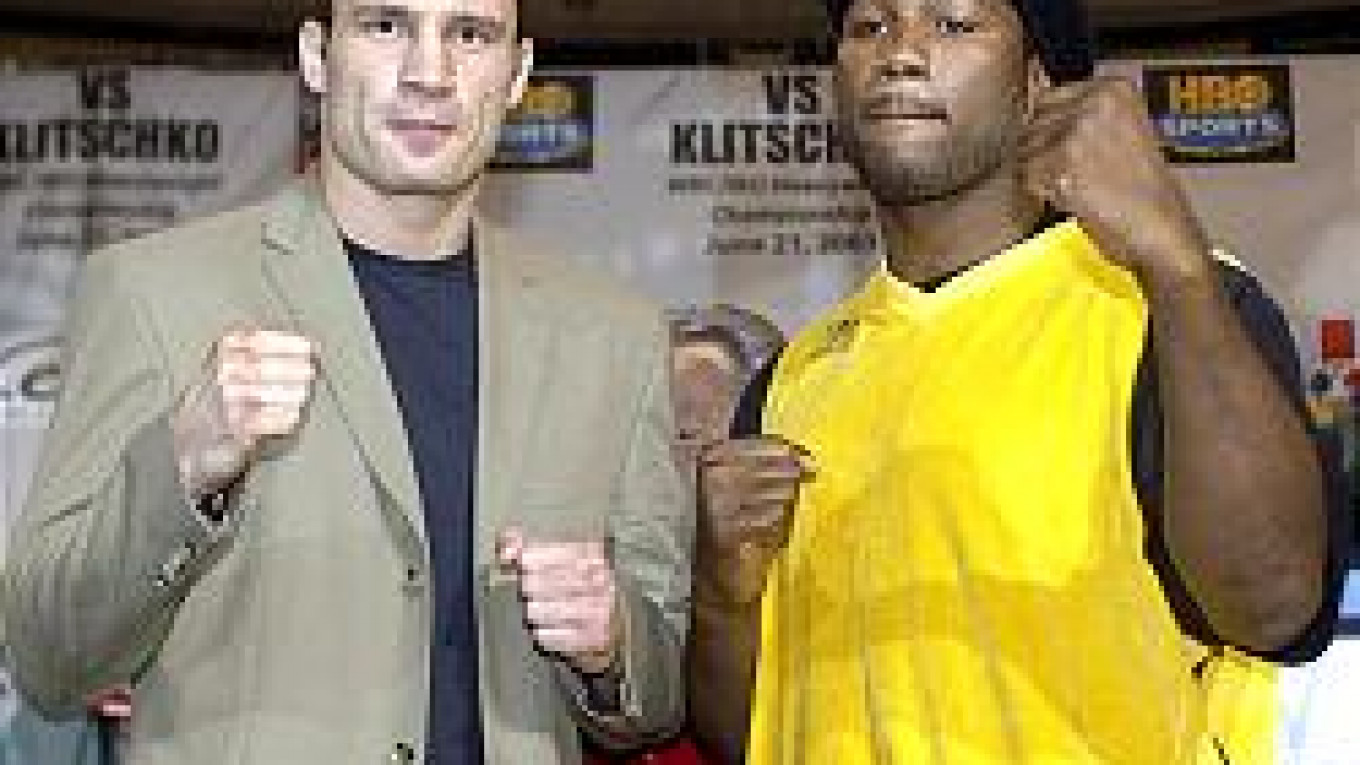But according to Professor Leonid Volkov they sum up Ukraine's best-loved boxer, Vitali Klitschko, who rarely boasts of his intellectual endeavors despite being a doctor of science in Ukraine and a professor of philosophy in Germany.
Volkov, who guided the elder of the Klitschko brothers through his degree and subsequent doctorate, says it is Klitschko's innate intelligence combined with his strength that will help him to beat Lennox Lewis on Saturday in Los Angeles, when the two battle for the World Boxing Council title.
"The difference is that he is a thinking boxer, unlike others. He watches and he learns," said Volkov, a former cyclist and now retired professor from the Pereyaslav Khmelnitsky Teachers' Training Institute.
"It is difficult to beat him because he knows where the next punch is coming from, he analyses bouts. He is not that kind of boxer who just wants to get stronger ... he is interested in developing his mind as well as his body, developing his intellect. He just wants to be more and more clever."
Despite moving to Germany, Klitschko is still loved in Ukraine, where at his old club, boys from age 14 to 25 train in a ring under his poster. Officials lament the fact that he left but understand his reasons -- to get access to better equipment and facilities.
The army boxing club is housed in a crumbling old building much in need of a lick of paint, new punching bags and more room for the young hopefuls to spar. But despite a lack of training shoes and sports kit, the youngsters all hope to become the next Klitschko.
"I want to be like Klitschko because he is ours. And I hope our Vitali Klitschko wins," says 15-year-old Andrei, boxing in his school shoes and an old camouflage T-shirt.
For Volkov, who is still in contact with Klitschko and younger brother Vladimir after he mentored them through their studies, the fact that Vitali studied for his PhD in Ukraine while his career was taking off showed he was disciplined and hard-working.
Serious, but with a sarcastic sense of humor, Klitschko would not be stopped in his pursuit of a doctorate, planning his methodology meticulously and setting up his own experiments.
"He was a student of physical education and for the first couple of years he was a dedicated student. He never missed a lecture or a class. ...Then gradually he became successful as a boxer and he started to get individual supervision," Volkov said.
"He would study by himself ... and this is how he graduated from the institute and got his degree. Then five or six months later, Vitali came up to me and said: 'Leonid Viktorovich, I am interested in one question -- being talented at sport, being good at sport -- what does it mean? Am I gifted or have I made myself talented?'"
That was how he started his PhD.
Working into the early hours during his trips to Ukraine, Vitali, Vladimir, a childhood friend and Volkov would analyze the data from experiments on national youth teams and argue about their conclusions.
"We had to open all the windows and the balcony doors because with three strong men in my room having to breathe, there was almost no oxygen," Volkov laughs, sitting in his two-roomed flat on the outskirts of Kiev.
They worked on making Klitschko a showman so he could defend his doctorate in front of alumni and also answer questions as to "why this young, good-looking, famous boxer wanted to become a doctor of science."
Volkov acknowledges that many thought Klitschko would buy his PhD -- an increasingly common practice in former Soviet Ukraine, where professors struggling on $80 to 90 a month often supplement their income by taking money for degrees.
"Anyone who knows Vitali knows he would not do that. He really did complete every experiment, he learned every word. He had a task and he fulfilled it."
Others say he writes his books -- one called "Our Fitness" to be published this month -- and theses for money.
"I do not think he does all this for money. ... He wanted to do it because he is a very curious man by nature. His curiosity comes from the fact that he observes, he loves observing and solving problems," Volkov said.
Acknowledging that Britain's Lewis was the more experienced of the two boxers, Volkov -- like most of Ukraine -- believes Klitschko will take the title in Los Angeles.
"I believe in Vitali this time. He is an experienced, clever boxer. I don't merely want him to win but I feel that he will win in the fifth or sixth round," Volkov said, adding that he has always had one piece of advice for Klitschko.
"I have always said to him: 'Don't let yourself get hit on the head, science needs you.'"
A Message from The Moscow Times:
Dear readers,
We are facing unprecedented challenges. Russia's Prosecutor General's Office has designated The Moscow Times as an "undesirable" organization, criminalizing our work and putting our staff at risk of prosecution. This follows our earlier unjust labeling as a "foreign agent."
These actions are direct attempts to silence independent journalism in Russia. The authorities claim our work "discredits the decisions of the Russian leadership." We see things differently: we strive to provide accurate, unbiased reporting on Russia.
We, the journalists of The Moscow Times, refuse to be silenced. But to continue our work, we need your help.
Your support, no matter how small, makes a world of difference. If you can, please support us monthly starting from just $2. It's quick to set up, and every contribution makes a significant impact.
By supporting The Moscow Times, you're defending open, independent journalism in the face of repression. Thank you for standing with us.
Remind me later.


